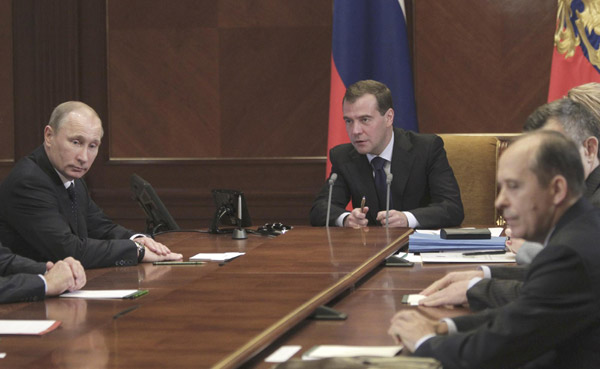Russia outlines response to US missile shield
Updated: 2011-11-24 09:45
(Xinhua)
|
|||||||||||
 |
|
Russia's President Dmitry Medvedev (C, rear) and Prime Minister Vladimir Putin (L) attend a meeting with members of the Security Council at the Gorki presidential residence outside Moscow November 23, 2011. [Photo/Agencies] |
MOSCOW - Russia may station contemporary missile systems in western and southern sections of the country if there are any additional US missile deployments in Europe, President Dmitry Medvedev said Wednesday.
In a live broadcast on national television, Medvedev outlined a series of possible "appropriate measures" if missile defense talks with Washington and NATO fail.
He reiterated that Moscow has long been seeking written, legal guarantees that the US missile shield in Europe will not target Russia, but so far "the concerns are not taken into account."
"If other measures are insufficient, the Russian Federation will deploy contemporary strike systems, for example, the Iskander systems, in the west and south in order to prevent fire damage from the US missile defense deployed in Europe," Medvedev said to Itar-Tass news agency.
Russia would deploy its striking Iskander missiles in southern Krasnodar region and Kaliningrad region, which borders Poland and Lithuania, he specified, noting that the US and NATO plan to have anti-missile system deployment in Poland, Turkey and Romania.
The Iskander missiles would be equipped with devices that enable them to get through anti-missile shields as well as destroy opponents' missile guidance and information capabilities, according to the president.
He added that he has issued instructions to the Defense Ministry and the armed forces to put an early warning radar station in Kaliningrad into operation and to upgrade protection of Russia's strategic nuclear forces.
The president also warned that Russia may withdraw from the Strategic Arms Reduction Treaty (START) with the US if the situation with the European anti-missile defense develops in an unfavorable way.
"Given the direct link between strategic offensive and defensive weapons, reasons could emerge for Russia's withdrawal from the START treaty. This is stipulated by the treaty itself," he said.
Russia and the US signed a 10-year strategic arms reduction treaty in April 2010 to replace the old one which expired in 2009. The new treaty, which came into force in February 2011, requires both sides to cut their strategic nuclear missiles to 1,550 units, and submarine-based missiles and heavy bombers to 700 units.
Nevertheless, Medvedev maintained that Moscow is still willing to continue talks with the US on condition that Russia's security concerns will be put into a legally binding document.
"It is still not too late to reach such an agreement," he said.
Meanwhile, Medvedev reaffirmed that Russia would not participate in the European missile defense program, because it could undermine the country's strategic potential in the next few years.
"We will not agree to take part in a program which, in a relatively short time, five, six, eight years, will weaken our containment potential. But exactly that program - European missile defense, has started," Medvedev said.
Russia and NATO have agreed to cooperate on the European missile defense system at the Lisbon summit last November, but differences in approach toward the issue led to a deadlock in negotiations.
Hot Topics
HIV/AIDS, Egypt protest, Thanksgiving, climate change, global economic recovery, home prices, high-speed railways, school bus safety, Libya situation, Weekly photos
Editor's Picks

|

|

|

|

|

|







